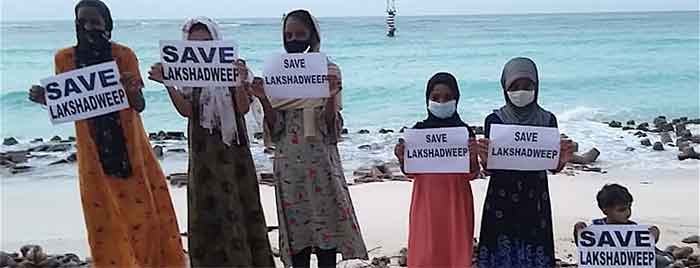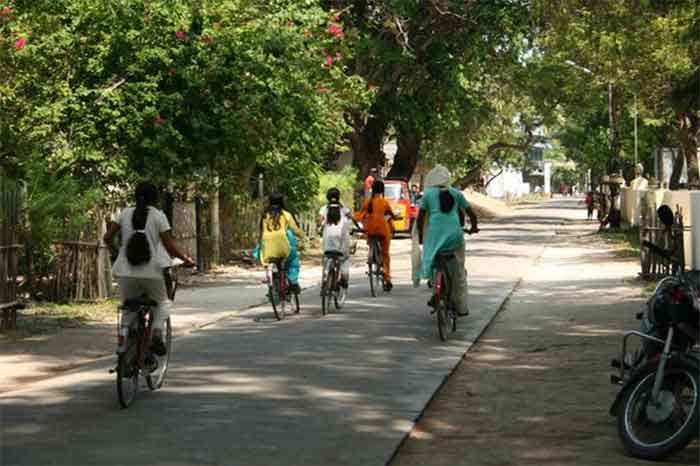
To
Hon’ble Chairman
National Commission for Scheduled Tribes (NCST)
Hon’ble Chairman,
I enclose here a copy of a representation dated 8-6-2021 submitted by me to Rashtrapatiji on the concerns I have on a range of statutory regulations proposed to be adopted by the Administrator of Lakshadweep Union Territory (UT), which will have a significant impact on the lives of the islanders and their ecology. In my submission to Rshtrapatiji, I had specifically requested for ensuring that the government makes a reference to the NCST for the Commission’s considered views.
As a concerned citizen and a former Commissioner for Tribal Welfare in the erstwhile State of Andhra Pradesh, I take the liberty to seek your suo motu intervention in ensuring that the policy initiatives taken by the Centre are based on a close consultation with the people of Lakshadweep and that those measures provide adequate safeguards to respect their culture and identity, protect their traditional rights to land and conserve their unique ecology.
I understand that that the Administrator of Lakshadweep has formulated a number of important regulations, such as the Lakshadweep Development Authority Regulation (LDAR), the Lakshadweep Prevention of Anti-Social Activities Regulation, the Lakshadweep Animal Preservation Regulation (LAPR) and amendments to the Lakshadweep Panchayat Regulation. There are other steps already initiated by the Centre in the case of Lakshadweep, such as “Lakshadweep and Andaman & Nicobar Islands Industrial Development scheme (LANID)” notified on 1-1-2019 and the proposal floated through an international tender enquiry in 2019 for taking up the “Development of Minicoy Island, Eco-Tourism Resort” project. All these measures are likely to introduce paradigm changes in the lives of the islanders.
Article 338A (9) of the Constitution stipulates that the “Union and every State Government shall consult the Commission (National Commission for Scheduled Tribes) on all major policy matters affecting Scheduled Tribes”. Considering that a predominant proportion of the population of Lakshadweep have been notified under the Constitution as belonging to the Scheduled Tribes (STs) and since the proposed measures involve policy changes that affect their lives, the Centre ought to have first sought the considered views of the NCST, before proceeding further. I am not sure whether any such consultation with the Commission has taken place at all and whether the Commission’s views and suggestions have been duly taken into account. If not, this is a fit case in which NCST could intervene on its own, as required under Article 338A(9).
As early as in 1952, the following five guiding principles (Panchsheel for Tribals) were enunciated by the Centre in the matter of evolving a national policy for tribal welfare and development.
>> People should develop along the lines of their own genius, and the imposition of alien values should be avoided.
>> Tribal rights in land and forest should be respected
>> Teams of tribals should be trained in the work of administration and development.
>> Tribal areas should not be over administered or overwhelmed with a multiplicity of schemes.
>> results should be judged not by statistics or the amount of money spent, but by the human character that is evolved.
These principles remain eminently valid today and, in the specific case of the islands like Laskshadweep populated by the STs, they assume importance like never before.
On news reports that appeared on the concerns expressed by the political leaders of Ladakh, which became a separate UT on 5-8-2019 when Article 370 was revoked, the Commission took suo motu notice of the same and recommended, at their 119th meeting held on 11-9-2019, that Ladakh be given special Constitutional status under the Sixth Schedule. The considerations that prompted the Commission to do so were that such a status would help in
1) democratic devolution of powers,
2) preserve and protect the distinct culture of the region,
3) protect agrarian rights including rights on land and
4) enhance devolution of funds for speedy development of Ladakh region
To a large extent, the concerns expressed in the case of Lakshadweep are not in any way vastly different from the above. Therefore, on the basis of similar considerations, Lakshadweep also becomes eligible for a special Constitutional status and perhaps there is no reason why such a status for the islands be not recommended to the government. The essence of such a special status is that the local communities in Lakshadweep would have a prominent role in decision making on policy matters that concern their lives.
I understand that there were reports on similar concerns in the case of Lakshadweep that have come to the attention of the Commission and a final decision is yet to be taken.
Keeping in view the problems faced by the other tribal regions in india, there is an urgent need to piut in place adequate safeguards to protect the land, the environment and the culture of the people of Lakshadweep and discourage basic changes in the demographic pattern of the islands that go against their interests. As in the case of the Fifth and the Sixth Schedule areas in the country, there is a need for greater involvement of the islanders in decision making on development activities that affect their lives. Prescriptive models imposed from above cannot help and what constitutes ‘development” should be decided by the people themselves.
I earnestly appeal to the Commission to consider the matter concerning Lakshadweep at the earliest, elicit the views of the people of the UT and recommend suitable safeguards in harmony with the islanders’ wishes.
Considering that Lakshadweep is a UT without a legislature, it is all the more desirable that a wide consultation is held with the local communities there, the elected representatives from the UT and the ST legislators in the Parliament, before making major changes in the policy. I request the NCST to consider the case of Lakshadweep keeping this aspect in view while recommending specific safeguards to protect the cultural identity and tthe traditional rights of the islanders.
Regards,
Respectfully,
E A S Sarma,
Former Commissioner for Tribal Welfare in AP, Former Secretary to Government of India
GET COUNTERCURRENTS DAILY NEWSLETTER STRAIGHT TO YOUR INBOX















































